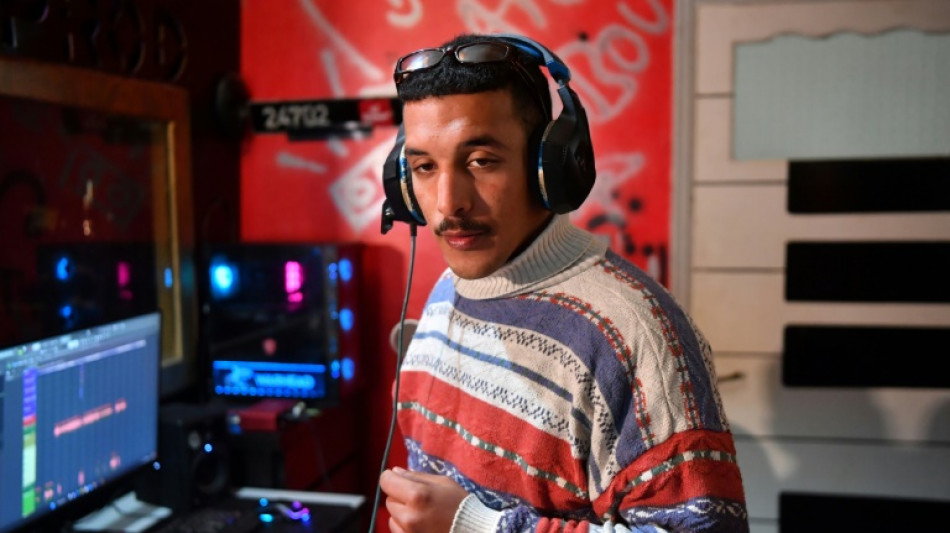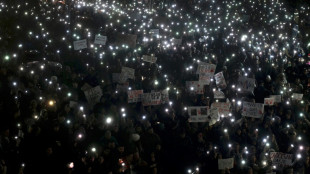
-
 Sweeping Vietnam internet law comes into force
Sweeping Vietnam internet law comes into force
-
Thousands attend Christmas charity dinner in Buenos Aires

-
 Demand for Japanese content booms post 'Shogun'
Demand for Japanese content booms post 'Shogun'
-
Mystery drones won't interfere with Santa's work: US tracker

-
 Global stocks mostly higher in thin pre-Christmas trade
Global stocks mostly higher in thin pre-Christmas trade
-
NASA probe makes closest ever pass by the Sun

-
 Global stocks mostly rise in thin pre-Christmas trade
Global stocks mostly rise in thin pre-Christmas trade
-
Global stocks mostly rise after US tech rally

-
 Investors swoop in to save German flying taxi startup
Investors swoop in to save German flying taxi startup
-
Saving the mysterious African manatee at Cameroon hotspot

-
 The tsunami detection buoys safeguarding lives in Thailand
The tsunami detection buoys safeguarding lives in Thailand
-
Asian stocks mostly up after US tech rally

-
 US panel could not reach consensus on US-Japan steel deal: Nippon
US panel could not reach consensus on US-Japan steel deal: Nippon
-
The real-life violence that inspired South Korea's 'Squid Game'

-
 El Salvador Congress votes to end ban on metal mining
El Salvador Congress votes to end ban on metal mining
-
Five things to know about Panama Canal, in Trump's sights

-
 Mixed day for global stocks as market hopes for 'Santa Claus rally'
Mixed day for global stocks as market hopes for 'Santa Claus rally'
-
Trump's TikTok love raises stakes in battle over app's fate

-
 European, US markets wobble awaiting Santa rally
European, US markets wobble awaiting Santa rally
-
NASA solar probe to make its closest ever pass of Sun

-
 Volkswagen boss hails cost-cutting deal but shares fall
Volkswagen boss hails cost-cutting deal but shares fall
-
Sweden says China blocked prosecutors' probe of ship linked to cut cables

-
 UK economy stagnant in third quarter in fresh setback
UK economy stagnant in third quarter in fresh setback
-
Global stock markets edge higher as US inflation eases rate fears

-
 US probes China chip industry on 'anticompetitive' concerns
US probes China chip industry on 'anticompetitive' concerns
-
Mobile cinema brings Tunisians big screen experience

-
 Honda and Nissan to launch merger talks
Honda and Nissan to launch merger talks
-
Asian markets track Wall St rally as US inflation eases rate fears

-
 Honda and Nissan expected to begin merger talks
Honda and Nissan expected to begin merger talks
-
Asian markets track Wall St rally as US inflation eases rate worries

-
 Trump vows to 'stop transgender lunacy' as a top priority
Trump vows to 'stop transgender lunacy' as a top priority
-
Beyond Work Unveils Next-Generation Memory-Augmented AI Agent (MATRIX) for Enterprise Document Intelligence

-
 Sweet smell of success for niche perfumes
Sweet smell of success for niche perfumes
-
'Finally, we made it!': Ho Chi Minh City celebrates first metro

-
 Tunisia women herb harvesters struggle with drought and heat
Tunisia women herb harvesters struggle with drought and heat
-
Trump threatens to take back control of Panama Canal

-
 Secretive game developer codes hit 'Balatro' in Canadian prairie province
Secretive game developer codes hit 'Balatro' in Canadian prairie province
-
Stellantis backtracks on plan to lay off 1,100 at US Jeep plant

-
 Banned Russian skater Valieva stars at Moscow ice gala
Banned Russian skater Valieva stars at Moscow ice gala
-
Biden signs funding bill to avert government shutdown

-
 Sorrow and fury in German town after Christmas market attack
Sorrow and fury in German town after Christmas market attack
-
France's most powerful nuclear reactor finally comes on stream

-
 Sierra Leone student tackles toxic air pollution
Sierra Leone student tackles toxic air pollution
-
Amazon says US strike caused 'no disruptions'

-
 Qualcomm scores key win in licensing dispute with Arm
Qualcomm scores key win in licensing dispute with Arm
-
Scientists observe 'negative time' in quantum experiments

-
 US approves first drug treatment for sleep apnea
US approves first drug treatment for sleep apnea
-
Amazon expects no disruptions as US strike goes into 2nd day

-
 US confirms billions in chips funds to Samsung, Texas Instruments
US confirms billions in chips funds to Samsung, Texas Instruments
-
Wall Street rebounds despite US inflation ticking higher


Rap battle: young Tunisians fight stigma with the arts
"We're sick of being seen as thugs," said Mohamed Ali Ayari, a rapper from a down-at-heel Tunis district, where jobless youth are finding a voice through music, cinema and photography.
The Tunisian capital's working-class districts have suffered from decades of state neglect and poor services, and residents say the stigma attached to their neighbourhoods shuts them out of the job market.
"This contempt and these prejudices really complicate our lives," said Ayari, a resident of the overcrowded Douar Hicher suburb.
The 23-year-old works as a security guard, but his dream is to become a famous rap artist.
"I want to come out into the light," he raps in a recent video clip, produced with the help of peace-building charity International Alert.
Ayari was among the winners of a recent competition by International Alert, asking young people from four neglected Tunis districts to express themselves through music, documentary or photography, focusing on the theme of violence.
"People... experience violence on a daily basis -- some practice it and others suffer it," said Houcem Ayari of International Alert. "We decided to channel that into cultural activities."
In a drab building in Douar Hicher, rapper Ayari sits in a tiny room converted into a studio and records his latest track, with backing vocals from neighbourhood friends.
Ayari and his friends agreed a lack of cultural spaces makes it easy for people to be dragged into crime.
- 'Therapy against depression' -
Wassim Tayachi, 22, said he and his friends "chose music to talk about ourselves and our lives, the lost youth and those of us who want to succeed, the police who attack us verbally and physically, the state that neglects us and society that stigmatises us."
He said coming from poorer neighbourhoods makes it harder to find a job or get official paperwork.
"A state that doesn't listen to its young people can't give them anything," Tayachi added.
Ayari said he wants to become a successful rapper.
But he doubts he can achieve his dreams in the North African nation, where a long-running socio-economic crisis has pushed many young people to try to reach Europe -- including on dangerous and overcrowded inflatable boats across the Mediterranean.
Meanwhile, he said he uses rap as "therapy against depression and illegal temptations".
Another winner of the competition was a documentary depicting social and economic injustice, sexual harassment, shabby public transport and school absenteeism in the district of Fouchana.
They are issues close to the heart of Mariem Chourabi, who has qualified as a tax accountant and has set up a centre to give children extra education support -- all by the age of 24.
Many young people here "want to succeed more than others because their difficult circumstances push them harder", Chourabi said.
- 'Environmental violence' -
Belhssan Jabri, a qualified civil engineer, won the photography category of the competition.
"We deserve not to be neglected," said the unemployed 26-year-old from the working-class district of Sidi Hassine.
Jabri's work focuses on what he calls "environmental violence", showcasing public spaces near his home strewn with trash.
"These could be places for sports or cultural activities, or gardens, instead of being permanently cluttered with overflowing rubbish bins," he said.
Jabri said those in power should find "real will" to change things for the better.
"There are doctors, engineers, artists and many educated and qualified young people in our neighbourhood," he said.
"Stop focusing on the negative side and stigmatising young people from working-class neighbourhoods."
S.F.Lacroix--CPN




